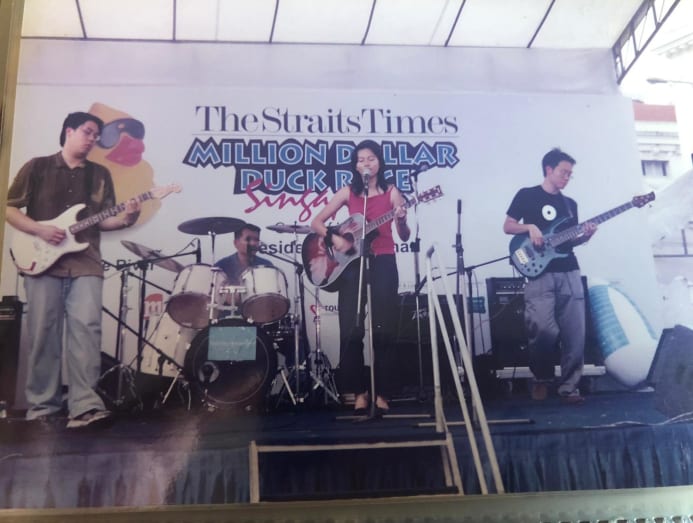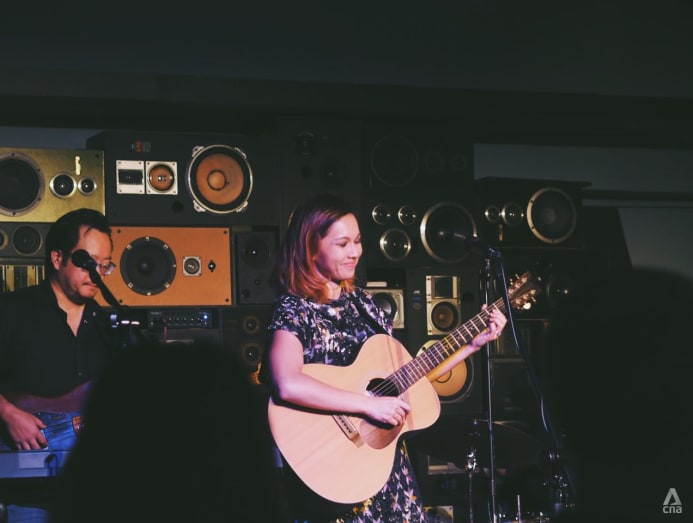How 2 lawyers and a property agent found their way back to indie music after disbanding as teenagers
Local band Fool’s Decade performed together as teenagers before they split. With their new album comprising all original songs, some may say their reluctance to play covers exclusively and their average age of 40 puts them at a disadvantage to re-enter the local music scene. But for the Gen X-ers, staying true to themselves is key for their new chapter in life.

Singapore alternative rock band Fool's Decade comprising (from left) Stephen Cheong on bass, Lynette Ooi on vocals and Benjamin Oh on electric guitar. (Photo: CNA/Kelvin Chia)

This audio is generated by an AI tool.
A lawyer walks into a bar – the kind she was called to even before law school. Being adept at drafting legal contracts doesn't matter at this type of bar. Support is won through words of a different persuasion – a skill that Lynette Ooi has been honing more than half her life.
Ooi, now 39 and in-house counsel at a global fintech company, started writing her own songs at 15 as she harboured dreams of being a rock musician. Music was always “a big part” of her life and how she processed her emotions, she recalled.
The singer-songwriter for Singaporean alternative rock band Fool’s Decade penned all seven songs on their debut album Bloom, released last weekend on all streaming platforms after more than two years in the making.
Ooi is no stranger to the stage or the local music scene. Neither is her band – comprising Stephen Cheong on bass and Benjamin Oh on electric guitar – which will play at The Blackbird, a live music bar and restaurant at Gillman Barracks, on Saturday (Nov 18) for their launch event.
They last performed at the bar in August to a packed room, their first live gig in more than two decades.

The band, whose influences include Radiohead, Paramore and the Red Hot Chili Peppers, first played at The Straits Times Million Dollar Duck Race in 2000 under a different name: Blind Faith, My Dear. But barely a few gigs later including at bars, reality got in the way and the then-teenagers parted ways to pursue their studies and careers.
Now 42, Cheong went on to study law like Ooi, becoming an international disputes lawyer in private practice. Oh, 41, entered his family’s chicken rice business before recently becoming a real estate agent. Ooi and Oh also each started their own families.
It would take 10 years after they disbanded for their first reunion and another 10 for their second during the pandemic. The latter, in 2020, resulted in a decision to restart the band.
COMING TOGETHER AGAIN
Seeing each other again, especially amid a global pandemic, reminded Cheong how nice it was to “hang out and do the things that we used to do when we were much younger and life was a lot simpler”.
Oh, who was also the guitarist for Chinese alternative rock band Goose by then, said the songs they wrote together when they were 16 to 17 still played in his head over the years. And by that time, Ooi had also written many new songs.
The band figured that if they couldn’t play the songs live, they should put them down. Specifically, in an album.

To start, they had to coin a new name. Their original name Blind Faith, My Dear was a reference to what Oh told Ooi when they first met on mIRC (a popular internet relay chat programme for Windows). Oh had asked Ooi to form a band, joining as the singer. Ooi, who played drums at the time, asked Oh how he knew she could sing. His reply became their band's name.
Now, Fool’s Decade is a “cheeky reference” to the 90s – their favourite decade for music – when German band Fools Garden dominated the airwaves with one-hit wonder Lemon Tree.
But it is also “a reflection of the time we spent apart”, and a reference to time which is a common theme in their songs, said Ooi, who also plays the acoustic guitar and keyboard.
“We love exploring the idea of time. Often, people fear time, the effects of change, regret and loss. We explore those darker themes in our songs Looking Glass, Your Smile and Time Is A Weapon,” she explained.
“But time can also bring great learning and transformation and adventure. You’ve got to have a sense of humour along the way too. So we have more light-hearted and hopeful tracks: Change Your Life and Sign Of The Times.”
It was nothing short of a miracle to Ooi, whose guest room was converted into their studio, that “everyone was interested in (putting out the album) and had the passion to drive it forward at this stage of our lives”.
Yet, even with a common goal, it was often challenging to get together. Each of them had “different obligations”, including Oh’s then soon-to-be-born third child. Sometimes, months went by without a jamming session.
They were “very understanding” of each other’s schedules, like being mindful of when Oh’s wife would give birth and aiming to record as many tracks as possible before then, recalled Cheong.
JUGGLING DAY JOBS, FAMILY COMMITMENTS
Then they met industry veteran Daniel Chai, who became their music producer.
Chai, who has worked with Stefanie Sun and Kit Chan, told CNA Lifestyle he was “enthused” about Fool’s Decade because they wrote original songs – “especially in Singapore where a lot of times cover bands are still much more appreciated”.
The band also had “a certain sound that’s really very different from your regular cover band”, he said.
The Gen X-ers were not your average fresh-faced early-twenty-somethings shooting for superstardom. For one, they already had full-fledged careers in unrelated industries, which many might see as a sign that they weren't really interested in music. But for an industry that tends to put passion on a pedestal, Chai felt their demanding day jobs ironically gave them an edge.
“Whenever they play together, it sounds fresh. Because when you play every night at the bar or pub, you can get a bit jaded as with every job. So they have a certain freshness in that sense because they don’t play regularly like that,” he explained.
Chai, with more than 20 years of industry experience, also found Fool’s Decade to be “mature in a lot of aspects” and “more grounded in what they want to do”. It was “quite easy to work with them”, he added, because they’re not “a new, young band where there are a lot of ideas (that) don’t really work”.

Their work ethic from corporate life also carried over. “For a few months, we pushed ourselves hard producing the songs, making music videos and pitching ourselves for gigs,” said Ooi.
“When I do something, I want to do it really well. Given the time constraints we had, that put a lot of necessary pressure on us. I was very nervous; I felt I had a lot of skin in the game because a lot of the songs were very personal … I was doing a lot of marketing and I wanted things to be right.”
Admittedly, most of the songs on the album were written “with no intention of ever releasing them”, she said. One of the tracks, Your Smile, is about her brother’s passing. Another, titled Till You're Gone, was written when she was merely 15, and is the first original song the band performed live.
“There’s a lot of life experience embedded in the songs and we hope listeners can hear that journey and embrace those emotions,” she added. “The music also reflects each band member’s growth as a musician. For example, (Cheong’s) years playing with jazz bands and (Oh’s) sound having evolved as the guitarist of Goose.”
Ooi likened launching Fool’s Decade to building a startup, calling it a “very entrepreneurial” journey.
“We had to start from scratch, find a name and identity, figure out who would listen to us and how to get our brand out there. I had massive impostor syndrome marketing myself – I had written and played music my whole life, but putting my music on Spotify was an entirely different level,” she said.
When it got overwhelming, she held fast to their North Star: “It always came down to authenticity; always came down to original music, being creative and having a good time as well.”
PRIORITISING AUTHENTICITY
To that end, Chai helped the band strike a balance between staying true to their original product and making their songs “more radio-friendly”. For instance, he trimmed some of their initial six-minute tracks that were “too long”, even as he aligned with their values.
Bands just starting out might be tempted to add multiple layers and instruments to their tracks, but their producer encouraged them to “be authentic”, said Ooi.
“(The songs) must be repeatable, must be something you can go on stage and play as Fool’s Decade and not have to pay backup singers or use a backing track. It’s partly a practical point but it’s more a philosophical point,” she added.
“The album hardly has any backing vocals. Because of that, the guitar and bass fill a lot of space. (If we) put in all kinds of parts that don’t exist in the band, the arrangement won’t fill the space when you play it live.”
The band found themselves thinking commercially about what people would connect with, while remaining true to “who we are as people and as a band” by producing an album that they were “perfectly comfortable and happy with”.
Authenticity is also reflected in their decision to play at a venue, explained Cheong. He pointed to pubs along Boat Quay, for example, which tend to prefer Top 40 cover bands. Not that there’s anything wrong with such bands, he clarified, but simply mimicking songs that aren't their own doesn’t align with their values. When the band does play covers, they ensure there is a "strong fit" with their sound and that they can add "creative value".
“We had to be more selective and find a venue that would accommodate what we wanted to do, and I think we agreed that that was the way forward,” he said.

Oh, who used to play in cover bands, concurred. He “never found it fulfilling to learn other people’s songs and play them to an audience”, even though he could “very well” do so and “make money from that”.
“It feels like I was born to make this music, but my day job is around to pay for this. I work so that I can play music,” he said. “It’s just something within me that needs to burst out creatively. I find much more fulfilment in creating my own songs and putting them out there for whoever wants to listen.”
While the band is aware that they can be selective about venues precisely because music isn’t their main source of income, Ooi stressed that they are “very careful not to undercut local musicians” by accepting just any gig.
“We don’t behave like we don’t need the money because it’s just not fair to local artistes. So we do try to make sure we get paid and that it’s a meaningful gig," she said.
The strategy seems to have worked, at least according to Chai, who said the band had to “find their own niche; the people who really appreciate their music”. When they played their original songs live at The Blackbird in August, they found their tribe. Their songs “really reached out to certain people”, he said.

FULL CIRCLE
In their decades apart, each of them continued dabbling in music albeit in their own capacity, and it seems obvious in hindsight that their paths would converge again.
But Cheong recalled he was once “very forceful” in conveying the message to Ooi that he wasn’t “interested in these things anymore” when she tried to restart the band. Even after their first reunion that led to the occasional jamming session, he was “never serious” about continuing to play.
Despite the band first crossing paths again after 10 years, COVID-19 another decade later would prove to be the catalyst for their new chapter. Ooi remembered an occasion when she felt burnt out and burst out crying. "It was specifically because I said I miss music. I realised the times in my life that I feel more fulfilled or happier are because music is there,” she said.
“Sometimes, you think when you add something to your life, it’s just stressful. But actually, you’re adding a certain value, a sense of meaning and fulfilment. It’s not all tiring, it’s also energising.”
More than 20 years of hard-won life lessons have turned blind faith into clear-eyed optimism. And this homecoming of sorts is the result of time too; with enough of it, you find a way back to yourself. As Fool’s Decade has learnt, the time is never right to bloom – until it is.






